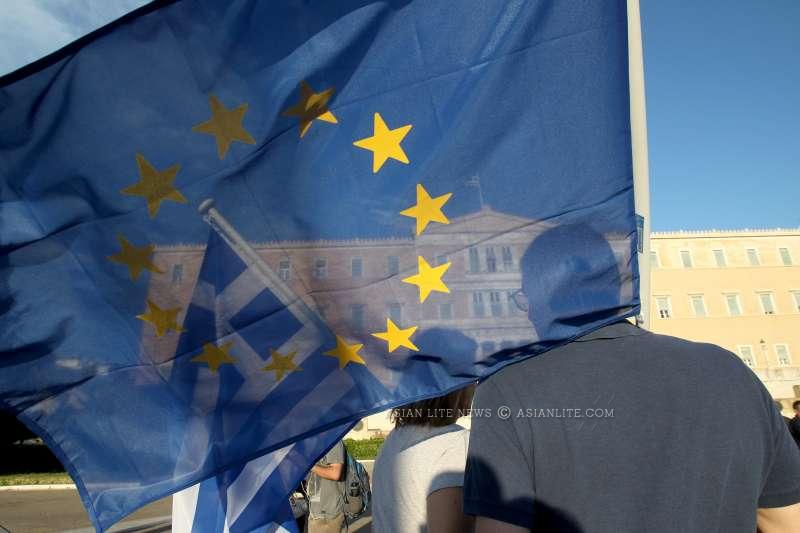Greece has missed the deadline for a €1.6bn (£1.1bn) payment to the International Monetary Fund (IMF), hours after eurozone ministers refused to extend its bailout….reports Asian Lite News

Greece is the first advanced country to fail to repay a loan to the IMF and is now formally in arrears. There are fears that this could put Greece at risk of leaving the euro, BBC reported.
Thousands of pro-EU protesters braved stormy weather and gathered outside the Greek parliament in Athens to urge a “yes” vote in a referendum on Sunday over whether the country should accept its creditors’ proposals. It follows a similar demonstration by those advocating a “no” vote – the path preferred by Mr Tsipras – on Monday.
Meanwhile, Labour MEPs called for the eurozone to offer Greece a bailout extension and better terms ahead of Sunday’s referendum, or risk a No vote that would plunge the country deeper into chaos.
Glenis Willmott MEP, Labour’s Leader in the European Parliament, said: “As always it is the people that suffer the most – the failures of successive Greek governments have wrought a terrible toll on the country. Alexis Tsipras talks a good game but his intransigence and arrogance has left Greece staring into the abyss.
“The choice the Greek people face on Sunday is not an easy one, but if they are to get out of this mess a deal must be done. The eurozone should extend the financial programme, giving a final push for a fairer deal to put before the Greek public.
“They should also revise the solidarity grant on low pensions, to ensure protection of the poorest pensioners and their families, and eurozone leaders must commit to a review of the long-term sustainability of Greece’s debt – currently running at 180 per cent of GDP – by the end of the year.
“One of the major benefits of European Union membership should be ever-increasing prosperity – yet for Greece the recent experience of ordinary people has been one of poverty and hardship, and unless the EU and Greek government change their approaches the situation will only get worse.”
EU leaders have warned that a no vote rejecting creditors’ proposals would mean Greece leaving the eurozone – though Mr Tsipras says he does not want this to happen.
The IMF confirmed that Greece had failed to make the payment, shortly after 22:00 GMT on Tuesday.
“We have informed our Executive Board that Greece is now in arrears and can only receive IMF financing once the arrears are cleared,” said IMF spokesman Gerry Rice.
With the eurozone bailout expired, Greece no longer has access to billions of euros in funds and could not meet its IMF repayment.
Eurogroup chairman and Dutch Finance Minister Jeroen Dijsselbloem earlier said it would be “crazy” to extend the Greek bailout beyond its Tuesday midnight expiration as Athens was refusing to accept the European proposals on the table.
Speaking after the conference call with other eurozone ministers, he added that a Greek request for a new €29.1bn European aid programme would be considered later.
The European Commission – one of Greece’s “troika” of creditors along with the IMF and the eurozone’s European Central Bank – wants Athens to raise taxes and cut welfare spending to meet its debt obligations.
Amid fears of a Greek default on its huge public debt of €323bn, people have queued at cash machines. Withdrawals are capped at just €60 a day.
Greek banks did not open this week after talks between Greece and its creditors broke down. However, up to 1,000 bank branches will re-open from Wednesday to allow pensioners – many of whom do not use bank cards – to withdraw up to €120.